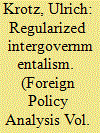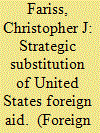| Srl | Item |
| 1 |
ID:
095596


|
|
|
|
|
| Publication |
2010.
|
| Summary/Abstract |
Despite seemingly little prospects and meager results, many developing countries invest substantial resources in regional cooperation organizations. Considering the widespread skepticism regarding the benefits of these organizations, this enthusiasm is puzzling. This study offers an answer to this puzzle and argues that under certain conditions international organizations among developing countries function as a signal of regional peace and stability. In turn, they reduce the political risk associated with foreign investment and increase the inflow of much needed capital to the economies of their members. I evaluate this argument in the context of the Association of Southeast Asian Nations (ASEAN). I show that Indonesia forcefully promoted the formation of ASEAN and that Indonesian foreign policymakers believed that joining this organization will reverse its aggressive and irresponsible image in the eyes of international donors and investors. Evidence regarding political risk and foreign direct investment in Indonesia and other ASEAN members provide additional support for the argument.
|
|
|
|
|
|
|
|
|
|
|
|
|
|
|
|
| 2 |
ID:
095598


|
|
|
|
|
| Publication |
2010.
|
| Summary/Abstract |
In the years since the end of apartheid, South Africa has emerged from its status as an international pariah to a full fledged member of the international community. Riding a wave of new found legitimacy bolstered by a heroic myth surrounding President Mandela, South Africa began to rethink its role in the world. Perhaps more than Mandela, however, former President Thabo Mbeki laid claim to the title of Africa's spokesman to the world. Mbeki, through his African Renaissance, cast himself as the embodiment of the modern, postcolonial African blending African tradition and symbolism with the rhetoric of free markets and good governance. What this paper argues is that Mbeki's Renaissance highlights both what constitutes legitimate policies and behavior and the role of legitimacy and legitimation itself in international relations.
|
|
|
|
|
|
|
|
|
|
|
|
|
|
|
|
| 3 |
ID:
095599


|
|
|
|
|
| Publication |
2010.
|
| Summary/Abstract |
Regularized intergovernmentalism refers to a distinct kind of foreign policy practice that connects and intertwines foreign policy processes in particular ways. This paper puts forth a concept to properly capture and expose such distinctive foreign policy realities characterizing certain periods and places. With this concept, the article systematically scrutinizes the intergovernmental fabric of bilateral Franco-German relations from 1963 to 2009. The characteristic features of Franco-German regularized intergovernmentalism represent a crucial foreign policy connection, foundational for European affairs of the past half century and a defining feature of Europe's post-war order and regional governance. Exploring key aspects of what it is that links France and Germany in particular ways, this paper offers a historically deeply grounded constitutive analysis. Based on its constitutive inquiries, the papers points at new possibilities of causal theorizing and explores some of regularized intergovernmentalism's hypothesized effects and limitations. Franco-German intergovernmental affairs may be the most developed instance of this practice. But regularized bilateral intergovernmentalism is not a Franco-German idiosyncrasy. Rather, it is an important and apparently growing approach to structuring foreign policy conduct, and seems an increasingly prominent aspect of how the world is organized.
|
|
|
|
|
|
|
|
|
|
|
|
|
|
|
|
| 4 |
ID:
095597


|
|
|
|
|
| Publication |
2010.
|
| Summary/Abstract |
I present a foreign policy decision-making theory that accounts for why US food aid is used strategically when other more powerful economic aid tools are at the disposal of policymakers. I focus my analysis on US food aid because this aid program provides an excellent case with which to test for the existence of foreign policy substitution. Substitution is an important assumption of many foreign policy theories yet proves to be an allusive empirical phenomenon to observe. Central to this analysis is the identification of legal mechanisms such as the ''needy people" provision in the US foreign aid legislation that legally restrict certain types of aid; this mechanism, however, does allow for the allocation of certain types of foreign aid, such as food aid, to human rights abusing regimes. Thus, I test if food aid is used as a substitute for human rights abusing states while methodologically accounting for other aid options. The empirical results, estimated with a multinomial logit and Heckman model, demonstrate that countries with high levels of human rights abuse are (i) more likely to receive food aid and (ii) receive greater amounts of food aid even when controlling for other economic aid, the conditioning effect of strategic interests and humanitarian need over the period 1990-2004.
|
|
|
|
|
|
|
|
|
|
|
|
|
|
|
|